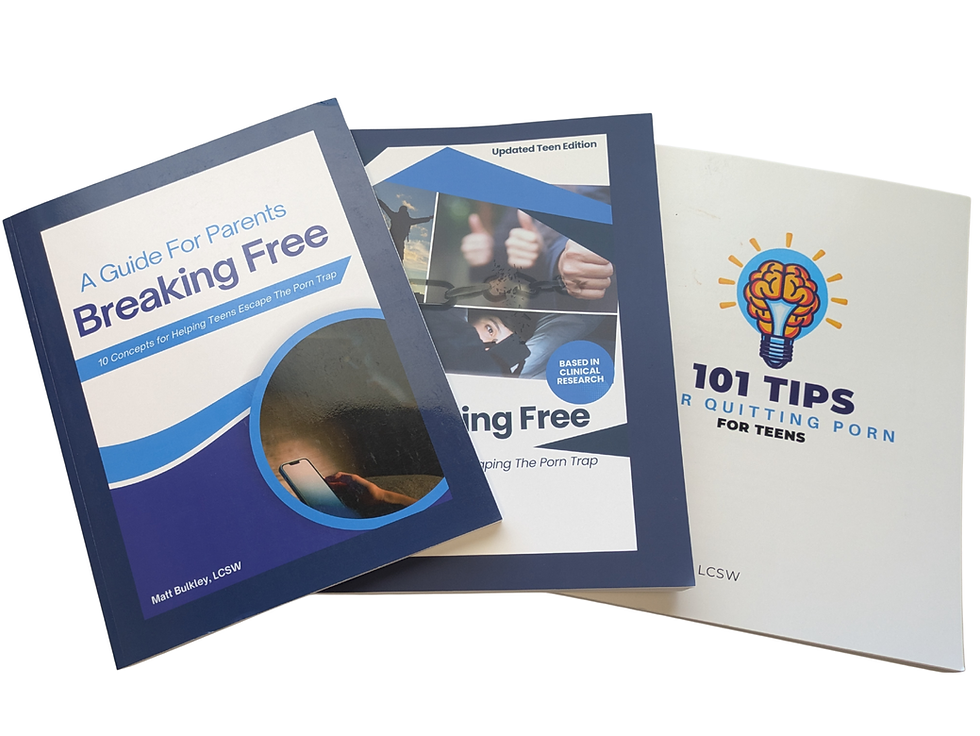The Power of Journaling to Understand Triggers: Helping Your Teen Overcome Pornography Addiction
- Matt Bulkley

- Jun 15
- 4 min read
Updated: Jun 18
As a parent, watching your teen struggle with pornography addiction can feel heartbreaking and overwhelming. You want to help them break free, but knowing where to start can be challenging. One effective and accessible strategy is encouraging your teen to journal their thoughts to identify their triggers. This simple practice, backed by research and expert insights, can empower your teen to understand what drives their behavior and take control of their recovery. Here’s why journaling matters and how you can support your teen in using it as a tool for healing.
Why Journaling Helps Teens in Recovery
Pornography addiction often thrives on unaddressed emotions, stress, or habits that teens may not even realize are triggering their behavior. Journaling offers a way to bring these hidden patterns into the open, helping your teen gain clarity and build strategies to avoid relapse. Here’s how it works and why it’s so powerful:
Uncovers Hidden Triggers
A 2021 study in Psychology of Addictive Behaviors found that writing down thoughts, feelings, and circumstances surrounding urges or relapses helps individuals identify specific triggers. For your teen, this might mean noticing that boredom, loneliness, or stress after a tough day at school pushes them toward pornography. By journaling regularly, they can spot these patterns and start addressing the root causes instead of just reacting to cravings.
Promotes Self-Awareness
Therapists often use journaling as a form of “self-monitoring,” a technique that helps teens become more aware of their emotional and mental states. According to a 2022 Journal of Behavioral Addictions report, self-monitoring through writing allows individuals to reflect on their choices and recognize moments of vulnerability. This awareness can help your teen pause and make healthier decisions when faced with temptation, reducing the likelihood of impulsive behavior.
Reduces Emotional Overwhelm
Writing down thoughts can be a release valve for pent-up emotions. A 2019 Frontiers in Psychology study showed that expressive writing lowers stress and anxiety, helping individuals process difficult feelings. For teens struggling with addiction, journaling can provide a safe space to explore emotions like shame, frustration, or loneliness without turning to pornography as an escape.
Builds a Proactive Mindset
Journaling isn’t just about looking back—it’s about planning ahead. By identifying triggers, your teen can start brainstorming ways to avoid or manage them. For example, if they notice that late-night scrolling triggers urges, they might decide to keep their phone out of the bedroom or replace screen time with a calming activity. This proactive approach, supported by clinical practices, empowers teens to take charge of their recovery.
How to Encourage Your Teen to Start Journaling
Introducing journaling to your teen may feel daunting, especially if they’re not used to writing or are hesitant to open up. Here are practical, empathetic ways to help them get started and make journaling a meaningful part of their recovery:
Explain the Purpose Gently: Share how journaling can help them understand themselves better and feel more in control. Frame it as a private, judgment-free tool, saying something like, “Writing down your thoughts can help you figure out what’s driving those tough moments, and I’m here to support you.”
Make It Simple and Accessible: Suggest starting with just a few sentences a day, using a notebook, a digital app, or even voice memos if writing feels intimidating. Encourage them to note their mood, what happened that day, and any moments they felt tempted. Keep it low-pressure to build consistency.
Provide Prompts to Get Started: Teens may not know what to write at first, so offer simple prompts like:
“What was I feeling before I felt the urge to look at porn?”
“What was going on today that made me stressed or bored?”
“What’s one thing I did today that I’m proud of?” These questions can guide their reflections and spark insight.
Respect Their Privacy: Assure your teen that their journal is for their eyes only unless they choose to share. This builds trust and makes journaling feel like a safe space. If they want to discuss what they’ve learned, listen without judgment and celebrate their self-awareness.
Model the Habit: Consider journaling yourself, even if it’s just a quick gratitude list or reflection. Sharing that you find it helpful can normalize the practice and show your teen it’s a valuable tool for everyone, not just a “fix” for their struggle.
Supporting Your Teen’s Broader Recovery
Journaling is a powerful tool, but it works best alongside other support strategies. Create opportunities for open, non-judgmental conversations about their challenges, reinforcing that you’re on their team. Professional counseling with a therapist experienced in addiction can help your teen dig deeper into their triggers and develop coping skills. Support groups or online communities can also provide encouragement, helping them feel less isolated.
Recovery from pornography addiction is a journey, and your patience is key. By encouraging journaling, you’re giving your teen a way to understand themselves better and build resilience against triggers. Celebrate their efforts, no matter how small, and remind them that progress takes time.
A Step Toward Healing
Journaling offers your teen a practical, private way to uncover the triggers behind their pornography addiction and take control of their recovery. By writing down their thoughts and emotions, they can gain clarity, reduce stress, and develop strategies to stay on track. This simple habit can be a turning point in their journey toward a healthier, more confident future.
Start today—help your teen pick a notebook or app, share a few prompts, and encourage them to give it a try. With your support, they can use journaling to outsmart their triggers and rediscover their strength.
Resources for Parents
Find guidance on supporting your teen using our Recovery Toolbox for Teens.










Comments